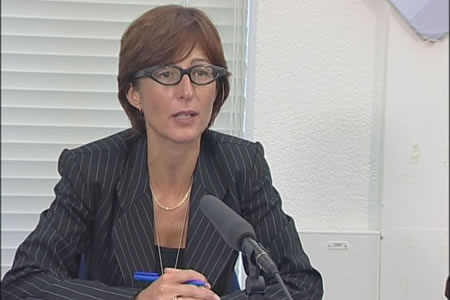Home
PROSECUTION WILL NOT CONTINUE WITH ITS CASE AGAINST MILOSEVIC
The Prosecution notified the Trial Chamber today that in order to avoid further unnecessary delays in the trial, it decided to rest its case against Slobodan Milosevic. Instead of hearing the testimony of the remaining witnesses, the prosecution seeks to admit further written and video evidence, including a "sincere and spontaneous" televised interview of the accused Milosevic from December 2000.
 Florence Hartmann, spokesperson in the Tribunal
Florence Hartmann, spokesperson in the Tribunal Convinced it has presented sufficient evidence concerning Slobodan Milosevic’s responsibility, the Office of the Prosecutor announced today that it intended to rest its case against the former president of Serbia and Yugoslavia. The prosecution will not call five witnesses who were supposed to be heard in the remaining two days allocated for its case, and at the same time it seeks to admit into evidence certain documents which, it submits, do not require to be admitted through witnesses.
Among the documents prosecutors seek to admit is an interview given by Slobodan Milosevic on 12 December 2000 to the Televizija Palma channel. Prosecutors say in the interview, the accused "sincerely and spontaneously" comments on a number of topics at issue before the court, such as the rejection of the Vance-Owen Peace Plan, his relationship with the Republika Srpska and the Republic of Serbian Krajina, and the scope of material assistance provided by then -Yugoslavia to the Bosnian and Croatian Serbs’ war effort. As evidence of Milosevic's "sincerity," the prosecution states that in the interview, the accused explained that his "blockade" of Republika Srpska was merely a "cunning political manoeuvre designed to mitigate the sanctions against the FRY."
The prosecution further seeks to admit into evidence an order dated 15 April 1999 – the only document of the Joint Command from the time of the Kosovo crisis and NATO intervention; the prosecution received it from Serbia and Montenegro’s authorities. Prosecutors allege the document "strongly corroborates" the testimony of Aleksandar Vasiljevic, Zoran Lilic and some other witnesses. It’s of special importance, they say, because it directly proves not only the authority of the Joint Command – headed by Milosevic at the time –over JNA units, but also over MUP forces and the armed non-Albanian civilians in Kosovo in 1999.
Also on the list of documents the prosecution is tendering into evidence is the TV series "The Death of Yugoslavia" and its sequel, "The Fall of Milosevic." Together with the video tapes, the prosecution is tendering the entire transcript of interviews with some of the main players in the events the TV series deals with, such as Borislav Jovic, Momir Bulatovic, Vojislav Seselj, Radovan Karadzic, Momcilo Perisic, Milo Djukanovic and others.
Finally, the prosecution seeks to admit into evidence several other minutes from closed sessions of the Assembly of Bosnian Serbs held in 1991 and 1992 that it received from Belgrade authorities last August but "misplaced" somewhere and so failed to admit them earlier when they admitted similar minutes.
Explaining the reasons that made the prosecution take this step, OTP spokesperson Florence Hartmann referred to the "specific situation" in the proceedings caused by both the resignation of Presiding Judge Richard May and the "repeated prolonged bouts of illness of the accused.” In such a situation, Hartmann stated, the prosecution did not wish the fact that it had two more days to conclude its case "to be used to further delay" the Milosevic case.
Tribunal officials were asked to comment on the latest statement of the Serbian government mandatory, Vojislav Kostunica, who said that cooperation with the Tribunal would not be among the "priorities" of his government. Spokesperson Jim Landale said the Tribunal considered the statement to be "very pathetic and deplorable." Indicating that The Hague "has taken notice" of the very clear response of the European Union and the Unites States to the future Serbian Prime Minister’s statement, Landale concluded that the "obligations as regards cooperation are perfectly clear under international law" and that Serbia, like all other States, is expected to comply with them.
Linked Reports
- Case : Milosevic Slobodan - "Kosovo, Croatia and Bosnia"
- 2004-02-22 WHAT IF MILOSEVIC DOES NOT CONSENT TO A REPLACEMENT FOR JUDGE MAY?
- 2004-02-12 VICIOUS CIRCLE OF BLOOD AND REVENGE
- 2004-02-11 SREBRENICA OPERATION WAS COMMANDED BY OFFICERS ON BELGRADE PAYROLL
- 2004-03-02 MILOSEVIC AND SELF-DEFENCE
- 2004-03-04 "SELF-DEFENCE" IS NOT A VIABLE OPTION FOR THE CRIMES IN BOSNIA AND HERZEGOVINA
- 2004-03-05 1.5 MILLION DOLLARS FOR "EXCULPATORY EVIDENCE" IN THE MILOSEVIC CASE
